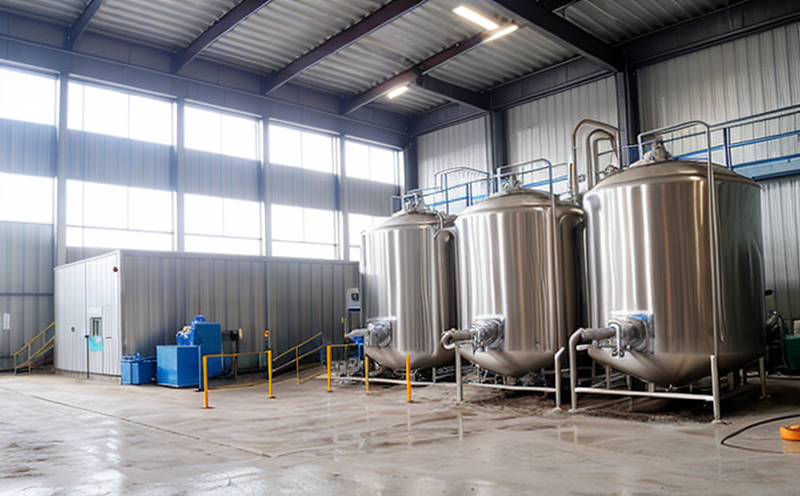ISO 17294 Uranium Test in Industrial Water
The ISO 17294 standard specifies procedures and criteria for determining uranium content in industrial water. This test is essential for quality managers, compliance officers, R&D engineers, and procurement professionals to ensure that the water used in critical processes meets safety standards and regulatory requirements.
Uranium contamination can have severe consequences on human health if it enters the food chain or water supply systems. In industrial settings, uranium may be present due to various activities such as mining, nuclear fuel processing, or waste management. The presence of even trace amounts of uranium in industrial process water can lead to costly downtime and reputational damage.
The ISO 17294 test ensures that the industrial water used is safe for its intended purpose. This includes potable water, boiler feedwater, cooling tower makeup water, and other process waters where contamination could impact product quality or worker safety. By conducting this test, organizations can prevent accidents, comply with regulatory requirements, and maintain a high standard of operational efficiency.
The procedure outlined in ISO 17294 involves several steps: sample collection, preparation, analysis using appropriate instrumentation, and interpretation of results. The primary goal is to ensure that the water does not exceed the specified limits for uranium content as set by regulatory bodies like the World Health Organization (WHO).
For accurate testing, it's crucial to follow strict protocols laid out in ISO 17294. This includes using certified reference materials and standardizing laboratory conditions to minimize variability. Additionally, regular calibration of equipment ensures reliable measurement results.
The test is performed on various types of industrial water samples including surface waters, groundwaters, and treated waters from different sources. The results obtained help determine whether the water meets the necessary safety standards for its intended use within an organization's processes.
Understanding the significance of this test requires knowledge about how uranium behaves in different environments and its potential impacts on both humans and ecosystems. By adhering to ISO 17294, companies can protect their workers from exposure risks while also safeguarding public health and environmental integrity.
Scope and Methodology
Scope: This section outlines the scope of the ISO 17294 uranium test in industrial water. It covers the types of samples that can be tested, the methods used for sample preparation, and the analytical techniques employed to measure uranium levels.
| Sample Type | Preparation Method | Analytical Technique |
|---|---|---|
| Surface Water | Pour into a clean container, filter if necessary | Inductively Coupled Plasma Mass Spectrometry (ICP-MS) |
| Groundwater | Filter and dilute as needed; ensure proper preservation | Inductively Coupled Plasma Optical Emission Spectroscopy (ICPOES) |
| Treated Water | Dilute if necessary; follow specific handling instructions | Atomic Absorption Spectroscopy (AAS) |
The analytical techniques mentioned above are chosen based on their sensitivity, accuracy, and precision. ICP-MS is particularly suited for low-level uranium detection in complex matrices like industrial waters.
Why Choose This Test
- Regulatory Compliance: Ensures adherence to international standards set by ISO 17294 and other relevant regulations.
- Risk Management: Identifies potential hazards early, allowing for corrective actions before they escalate into larger issues.
- Quality Assurance: Guarantees the consistency and reliability of water quality across multiple batches or sites.
- Safety: Protects workers from exposure to hazardous substances by ensuring safe operating conditions.
- Eco-Friendly: Minimizes environmental impact by preventing accidental releases into natural water bodies.
- Operational Efficiency: Reduces downtime associated with contaminated water systems, thereby enhancing overall productivity.
The ISO 17294 uranium test provides peace of mind to decision-makers responsible for maintaining safe and compliant industrial processes. It offers a robust framework that helps organizations stay ahead in terms of quality assurance and risk management practices.
Customer Impact and Satisfaction
- Informed Decision-Making: Provides accurate data on uranium levels, enabling informed decisions regarding water usage and treatment.
- Stakeholder Confidence: Demonstrates commitment to environmental stewardship and worker safety, boosting stakeholder confidence.
- Cost Savings: Prevents costly remediation efforts by identifying potential issues early in the process.
- Reputation Protection: Maintains a positive image by ensuring compliance with industry standards and best practices.
Our clients benefit from our comprehensive approach to ISO 17294 testing, which not only meets but exceeds expectations. We offer competitive rates alongside exceptional service that contributes directly to customer satisfaction.





